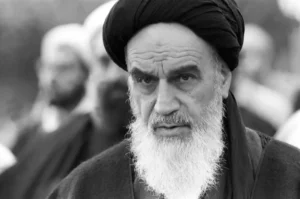A famous Pakistani Legislator and former cricketer Imran Ahmad Khan Niazi was born on 5 October 1952 in Lahore and held the position of the 22nd president of Pakistan from August 2018 to April 2022. He established and headed the Pakistan Tehreek-e-Insaf (PTI) political organization from 1996 to 2023.
Khan graduated from Keble College, Oxford, and started his cricketing career in 1971. He coached the Pakistan national cricket team frequently from 1982 to 1992, leading them towards their first and final Cricket World Cup victory in 1992. Considered one of the most significant versatile players in cricket, he received an induction into the ICC Cricket Hall of Fame and Museum.
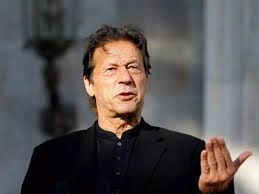
Beginning politics in 1996, Imran Khan won a National Assembly seat in 2002 and worked until 2007. PTI opposed the 2008 presidential elections but became the second-biggest party by votes cast in 2013. In the elections held in 2018, PTI emerged as the most powerful party, and Khan became the government’s leader.
As the government’s leader, Khan tackled fiscal difficulties, and secured IMF assistance, while encouraging social welfare initiatives like the Ehsaas Programme and Establish for Pakistan. He additionally handled the COVID-19 pandemic, which contributed to economic challenges and higher prices.
In early 2022, Khan argued the United States guided his ouster, which became known as Lettergate. He was dismissed from the workplace through a motion of no confidence in April. Later in the same year, he encountered charges under statutes against terrorism and became barred from office over the allusion to the Toshakhana case. Khan persevered through a murderous assault in November.
On 9 May 2023, Imran Khan had been apprehended on allegations of corruption, causing massive demonstrations. He was imprisoned to a term of three years in jail on 5 August 2023 for improperly using his position as premier to sell indicated gifts. Although an appellate court stopped his sentence on 29 August 2023, he continued to serve time for claiming leaking government secrets.
On 30 January 2024, he got a decade in prison for those allegations, followed by a further seven years on 3 February for violating Islamic marriage laws. The Islamabad High Court overturned the diplomatic cable decision on 3 June 2024, but Khan remains imprisoned for the marriage law conviction.
Early Life and Family of Imran Khan
Khan was born in Lahore on 5 October 1952, though some reports initially cited 25 November 1952 due to a passport error. He is the firstborn son of Ikramullah Imran Khan Niazi, a civil engineer. Khan grew up with four sisters in Mianwali, Punjab, from a paternal lineage of Pashtun descent, belonging to the Niazi tribe. His maternal family, originally from Kaniguram, South Waziristan, includes cricketing figures like his cousins Javed Burki and Majid Khan.
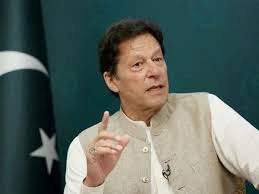
Raised in an affluent environment, Khan attended Aitchison College and Cathedral School in Lahore before studying at the Royal Grammar School Worcester in England. Imran Khan later pursued studies in philosophy, politics, and economics at Keble College, Oxford, graduating in 1975. His passion for cricket at Keble was supported by Paul Hayes, instrumental in Khan’s admission after an initial rejection by Cambridge.
Cricketing Career
Imran Khan premiered in Test cricket in the United Kingdom at Edgbaston in 1971. Getting back to Pakistan in 1976, he established his spot in the national team and became famous for developing the opposite swing-hitting technique.
Chosen captain in 1982 until he resigned, Khan performed his last Test match in January 1992 against Sri Lanka in the capital of Pakistan, He determined his entire innings with 88 Test matches, scoring 3807 proceeds at a rate of 37.69, including six-century innings and 18 fifties.
Entry into Politics
After retiring from cricket, Imran Khan founded Pakistan Tehreek-e-Insaf (PTI) in 1996, initially facing electoral challenges with less than 1 percent of the vote in 1997. PTI gained modestly in 2002, securing a single seat filled by Khan. He criticized alleged vote rigging for the party’s early electoral struggles.
Khan protested President Pervez Musharraf’s presidential candidacy in 2007 by resigning from the National Assembly and was briefly detained during a state of emergency in November. PTI condemned the emergency, boycotting the 2008 elections. Despite electoral setbacks, Khan’s populist criticisms of corruption and economic disparities resonated, especially among Pakistan’s youth.
In opposition
After leading PTI to opposition status in Punjab and Sindh, Imran Khan became its parliamentary leader. In July 2013, he faced a contempt of court notice for criticizing the judiciary, later withdrawn after clarification.
Under Khan, PTI won Khyber Pakhtunkhwa and enacted a tax-free budget for 2013–14. Criticized for supporting Sami-ul-Haq and his seminary, Khan pursued dialogue with the Pakistani Taliban, accusing the US of hindering peace efforts by drone-striking Taliban leaders.
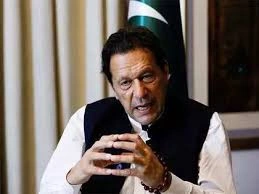
In 2014, Khan alleged election rigging and led a rally demanding Prime Minister Nawaz Sharif’s resignation. The rally encountered opposition, resulting in casualties and injuries. Khan later aligned with Tahir-ul-Qadri for regime change, negotiating a judicial commission to probe electoral rigging and potentially dissolve assemblies for fresh elections.
Political ascent
In the weeks leading up to the initial 2013 voting, Imran Khan and his ruling party received significant support and created massive crowds at rallies, which included seasoned politicians from established individuals. A 2012 views survey listed Khan as Pakistan’s most prominent ideological figure.
Days before the May 2013 elections, Khan fell at a rally but still made a final appeal from his hospital bed. Despite PTI’s best electoral performance, they secured fewer seats than Nawaz Sharif’s PML-N. Khan alleged election rigging, leading to four months of protests in late 2014 demanding Sharif’s resignation.
After the Panama Papers linked Sharif’s family to offshore holdings, Imran Khan organized more protests in 2016, later called off when the Supreme Court agreed to investigate. In 2017, Sharif was disqualified, forcing his resignation. Khan, though found with offshore holdings, was not disqualified.
In the July 2018 elections, Khan’s PTI won a plurality in the National Assembly. He became prime minister on August 18, 2018, focusing on anti-corruption and poverty alleviation despite criticisms of military ties.
Prime Ministership Of Imran Khan
During his premiership, Khan faced a mounting balance-of-payments crisis despite economic growth, exacerbated by high imports and debt from initiatives like the China-Pakistan Economic Corridor. Early challenges included the US withholding $300 million in military aid due to perceived anti-terrorism shortcomings. Khan sought aid from allies first, avoiding an IMF bailout initially, but eventually had to request emergency IMF funding. He also secured investments from China, Saudi Arabia, and the UAE.
In foreign affairs, Imran Khan facilitated Taliban-US talks and managed tensions with India after airstrikes in Kashmir. Pakistan downed Indian jets and captured a pilot but swiftly de-escalated by returning him to India. Khan intensified efforts against militants, including legal reforms.
The COVID-19 pandemic hit Pakistan hard in 2020, prompting Khan to eventually impose a nationwide lockdown after initial hesitation, focusing subsequent restrictions on high-infection areas.
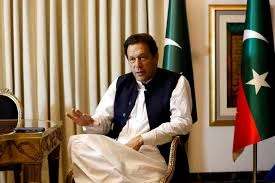
Departure from Office, Subsequent Political Activity, and Incarceration
Imran Khan faced mounting opposition during his tenure for his close ties with the military, crackdown on militants, and economic challenges. In late 2020, opposition parties formed the Pakistan Democratic Movement (PDM), accusing Khan of being a military puppet and demanding his resignation. Despite surviving a no-confidence vote in March 2021, Khan fell out with the military later that year over senior appointments.
Economic frustrations led to a confidence vote in March 2022, prompting PTI coalition withdrawals and defections. Imran Khan alleged a US conspiracy after visiting Russian President Vladimir Putin, revealing leaked diplomatic correspondence. The National Assembly ousted Khan on April 10, 2022, marking Pakistan’s first prime ministerial removal via no-confidence vote.
Under Shehbaz Sharif’s government, economic challenges persisted despite PTI’s strong showing in Punjab’s July 2022 elections. Khan faced legal issues, survived an assassination attempt, and was arrested in May 2023 for non-cooperation in corruption probes. Convicted in August 2023 but granted a retrial, Khan continued advocating for PTI’s return to power before the February 2024 elections, where PTI won the most seats but fell short of a majority.

